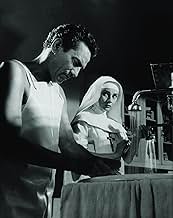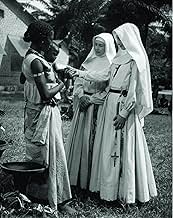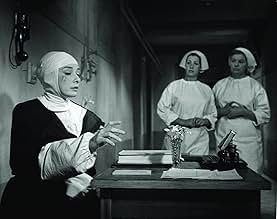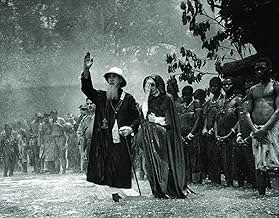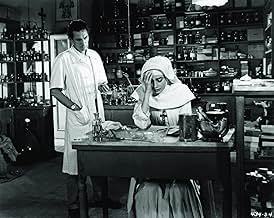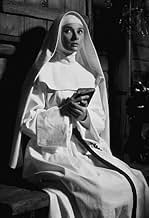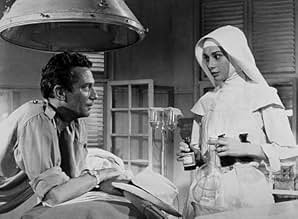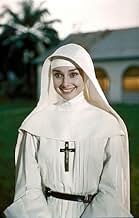Dopo aver lasciato una ricca famiglia belga per diventare suora, suor Luke, lotta con la sua devozione ai suoi voti durante la crisi, la delusione e la seconda guerra mondiale.Dopo aver lasciato una ricca famiglia belga per diventare suora, suor Luke, lotta con la sua devozione ai suoi voti durante la crisi, la delusione e la seconda guerra mondiale.Dopo aver lasciato una ricca famiglia belga per diventare suora, suor Luke, lotta con la sua devozione ai suoi voti durante la crisi, la delusione e la seconda guerra mondiale.
- Regia
- Sceneggiatura
- Star
- Candidato a 8 Oscar
- 11 vittorie e 23 candidature totali
- Rev. Mother Emmanuel (Belgium)
- (as Dame Edith Evans)
- Mother Mathilde (Africa)
- (as Dame Peggy Ashcroft)
Recensioni in evidenza
Director Fred Zinneman struck a correct balance of fine pace and sensitivity in the mesmerizing tale of a young Belgian girl who becomes a religious missionary and is sent to the Belgian Congo to work at a hospital . Finely starred by a luminous Audrey Hepburn as a dedicated nun who subsequently comes to question her vocation , as she is struggling to reconcile her free spirit and philanthropic wishes with the religious rigors ; Hepburn chalked up another hit in this long but always interesting flick based on Kathryn Hulme's novel , being rightly adapted by screenwriter Robert Anderson . Spectacular settings and well staged scenes , in fact , members of the Rome Opera ballet corps were hired to play some of the nuns, and complex convent rituals were literally choreographed for them . This agreeable flick packs an exciting screenplay , thought-provoking drama , fine interpretations and intelligent filmmaking . It's surprising that the movie didn't achieve any of the six Academy Award for which it was nominated ; however , it won NY Film Critics to best actress and director and British Academy gave prizes to best actress and support cast . Casting is frankly well . Good acting by Audrey Hepburn as a beautiful missionary nurse who gains the trust of the locals , not only providing medical care but dealing with African people ; this was one of Audrey Hepburn's favorite of her films and it was also one of her most financially successful . Excellent Peter Finch as a good surgeon , he doesn't quite hit it off with Gabriella at first but soon starts to develop deep affections for her . Furthermore , a nice support cast formed by notorious secondaries such as Edith Evans , Peggy Ashcroft , Dean Jagger ,Beatrice Straight ,Rosalie Crutchley , Ruth White , Barbara O'Neil , Lionel Jeffries , Colleen Dewhurst and Niall MacGinnis , among others . ¨Nun's story¨ consolidated a sub-genre about nuns or religious people in far countries , going on ¨Heaven knows , Mr Allison¨ by John Huston with Robert Mitchum Deborah Kerr , ¨The Sins of Rachel Cade¨ also produced by Henry Blanke and directed by Gordon Douglas with Angie Dickinson , Roger Moore and Peter Finch , too , and ¨A Nun at the Crossroads¨ with Rosanna Schiaffino and John Richardson , among others.
Appropriate as well as sensitive musical score by the classic Franz Waxman . Glamorous and evocative cinematography by Franz Planer , though mostly filmed on real African exteriors , in fact , the film was shot on location in Rome, Bruges, Stanleyville and a real leper colony in the Congo . The motion picture well produced by Henry Blanke was stunningly directed by Fred Zinneman. This is one of various and pleasant works , some major and minor successes of his long career as a filmmaker . He was a Hollywood veteran director, directing early movies and a long career until the 80s . With ¨The nun's story¨ Zinnemann chalked another major hit in this overlong but always absorbing tale . After acquiring the rights to Kathryn Hulme's bestselling novel, Fred Zinnemann found that no one in Hollywood had any enthusiasm towards turning it into a film, citing it as being devoid of action , but all that changed when Audrey Hepburn expressed a desire to take the lead role . Rating : 8 , Above average , well worth seeing .
This is an utterly fascinating story of a young nun (Audrey Hepburn), and a non-believing doctor (Peter Finch). Sister Luke (Hepburn) is constantly challenged in sticking to her vows, especially the one of obedience.
She chaffed at the rules that did not leave room for common sense. Is it better to strictly obey or to do more good in disobedience? It is a question asked over and over.
Things become more difficult as WWII starts. Now, the rules must be set aside to help the war effort. Eventually, the conflict between the rules and her need for independence is resolved.
Hepburn was fantastic, as was Finch. Well worth seeing.
Audrey Hepburn is Gabrielle van der Mal, a young Belgian woman who commits her life to Christ and becomes Sister Luke. Hepburn was proud of this film and justifiably so. Her portrayal (based on a true story) is riveting and authentic. The entire cast is excellent. Peter Finch plays Dr. Fortunati, a physician who challenges Sister Luke with his outspoken nature and his disregard for convention.
The narrative goes well beyond Sister Luke's struggle with her vows of poverty, chastity and obedience. It is a coming of age story and a celebration of self-actualization. In the end, the viewer is left wanting more. Hepburn extracts the maximum emotional impact from each scene, and we know there is much more to this story beyond the final, haunting shot.
Gabrielle van der Mal enters a convent in Belgium with the lukewarm approval of her surgeon dad. She is a trained nurse and has a heart for nursing, specifically in the Congo, which was a colony of Belgium's at the time. The film follows her through her first year and a half in the convent until she takes her final vows, the trials and tribulations she faces there, and her delay in finally being assigned to the Congo as a nurse.
This is a great film that doubles as a good documentary on what is involved in becoming a nun, so much so that I'd say that Gabrielle really didn't so much want to be a nun as she figured this was the only path to getting to serve in the Congo as a nurse - a primitive place with a great need for medical professionals of all kinds.
When Gabrielle finally does get to the Congo and has served as OR nurse to the agnostic Dr. Fortunati, she is panicked when the day comes that she is ordered to return to Belgium. Gabrielle isn't so much someone who sees herself as a rebel within the church - this is the tradition that she grew up in and she seems fine with it - as much as she sees everyday life in the convent as boring and tiresome, especially after several years of being a nurse in the Congo and being so very helpful.
Neither does she have a huge problem with forgiveness. In Africa a native beats another nun to death for no other reason than a witch doctor told the man that if he killed a white woman that the ghost of his dead wife would stop haunting him. In spite of the pointlessness of the murder, in spite of the fact that she knew the murdered nun, Gabrielle has sympathy and forgiveness in her heart for the killer. But then she returns to Europe and the Nazis invade and quickly take over Belgium. When they kill her father while he is tending to some refugees, Gabrielle realizes her heart is not big enough to forgive such systemic cruelty. At that point she must make a choice.
This film is based upon a novel written by Kathryn Hulme, the partner of Gabrielle van der Mal for over thirty years, until Hulme's death in 1981. Perhaps it was because the author was so close to Gabrielle that the main character is so well examined.
Lo sapevi?
- QuizThe role of Sister Luke was suggested for Ingrid Bergman but Bergman herself said she was too old for the role and instead proposed Audrey Hepburn.
- BlooperWhen the patient in the Congo hospital is being attended by several people, the voice of the actor playing the patient is obviously dubbed over by actor Dean Jagger, who plays Sister Luke's father in the film.
- Citazioni
Sister Luke: You can cheat your sisters, but you cannot cheat yourself or God.
Rev. Mother Emmanuel: Have you struggled long enough to say surely that you've come to the end?
Sister Luke: I think I've been struggling all these years, Reverend Mother. In the beginning each struggle seemed different from the one before it. But then they began to repeat, and I saw they all had the same core: obedience. Without question, without inner murmuring. Perfect obedience as Christ practiced it. As I no longer can.
Rev. Mother Emmanuel: Yes?
Sister Luke: There are times when my conscience asks which has priority. It or the Holy Rule? When the bell calls me to chapel, I often have to sacrifice what might be the decisive moment in a spiritual talk with a patient. I'm late every day for chapel or refectory or both. When I have night duty I break the Grand Silence because I can no longer cut short a talk with a patient who seems to need me. Mother, why must God's helpers be struck dumb by five bells in the very hours when men in trouble want to talk about their souls?
- ConnessioniFeatured in Hey Dad..!: Testing Time (1990)
- Colonne sonoreVoi Che Sapete
from "The Marriage of Figaro"
Written by Wolfgang Amadeus Mozart (as W. A. Mozart)
Played by Gabi and her father on the piano, and recurring throughout the film's score.
I più visti
Dettagli
- Data di uscita
- Paese di origine
- Lingua
- Celebre anche come
- The Nun's Story
- Luoghi delle riprese
- Brugge, West-Vlaanderen, Belgio(Convent exteriors, other exteriors)
- Azienda produttrice
- Vedi altri crediti dell’azienda su IMDbPro
Botteghino
- Budget
- 3.500.000 USD (previsto)
- Tempo di esecuzione
- 2h 29min(149 min)
- Colore
- Proporzioni
- 1.85 : 1


